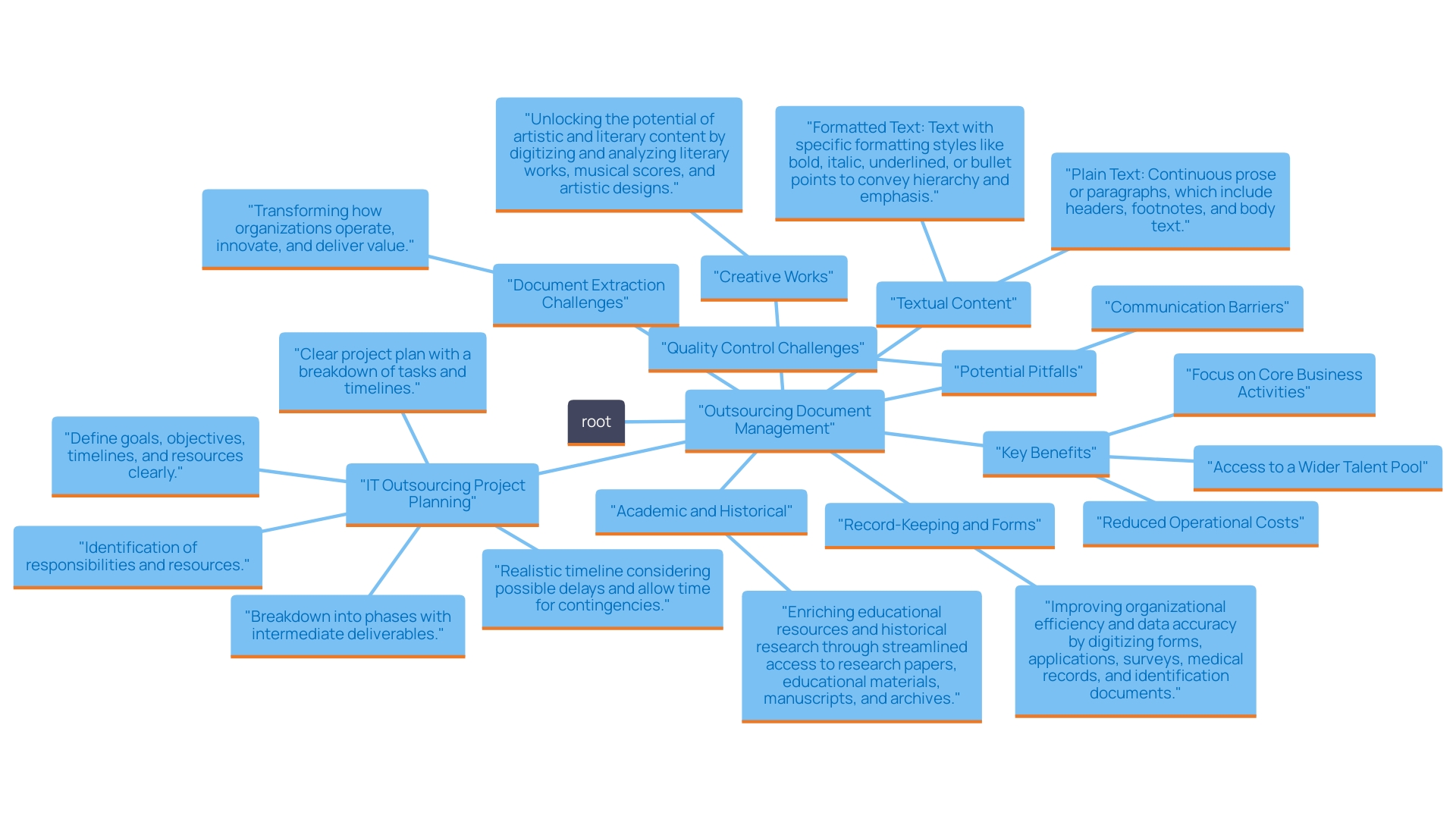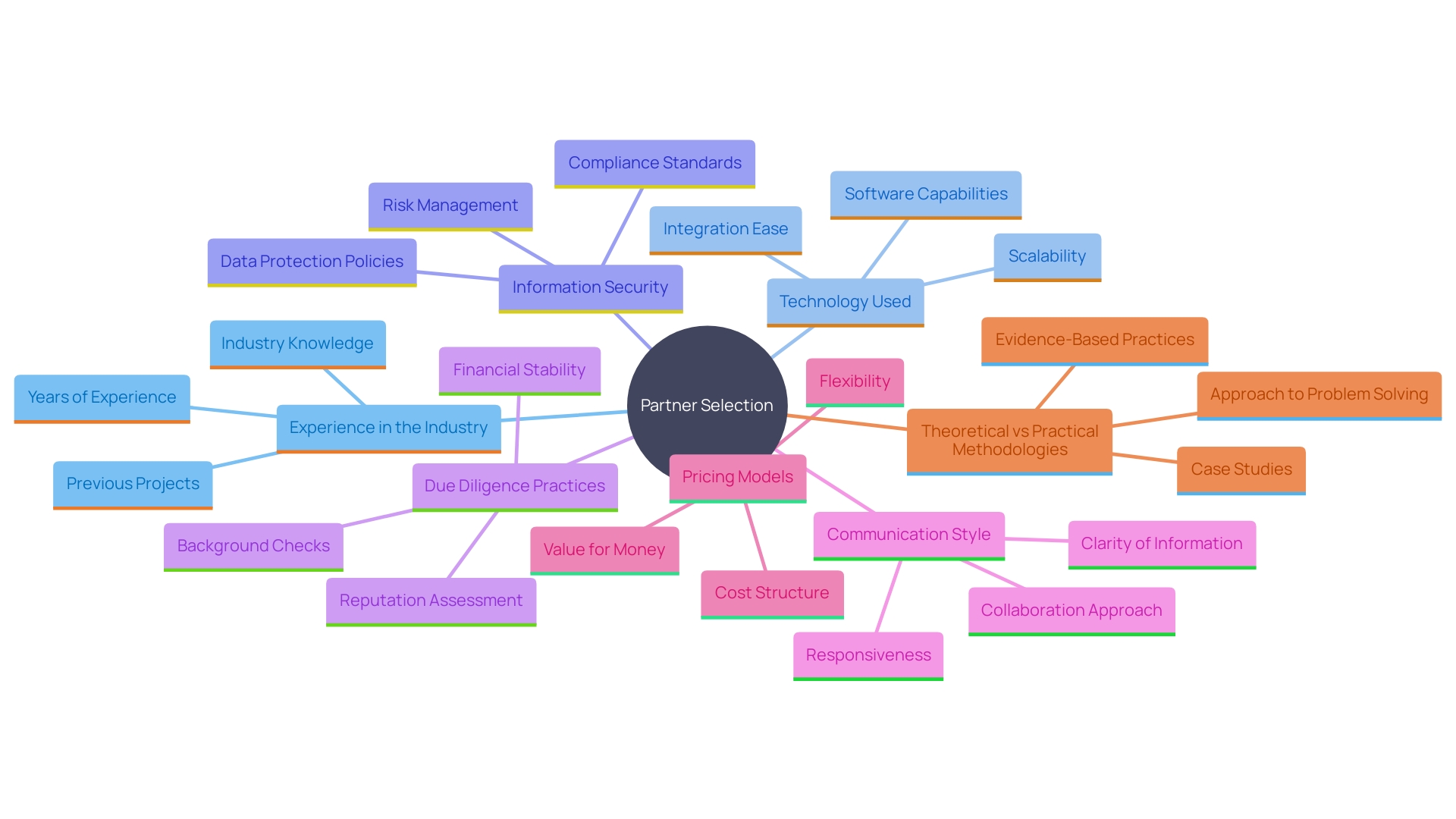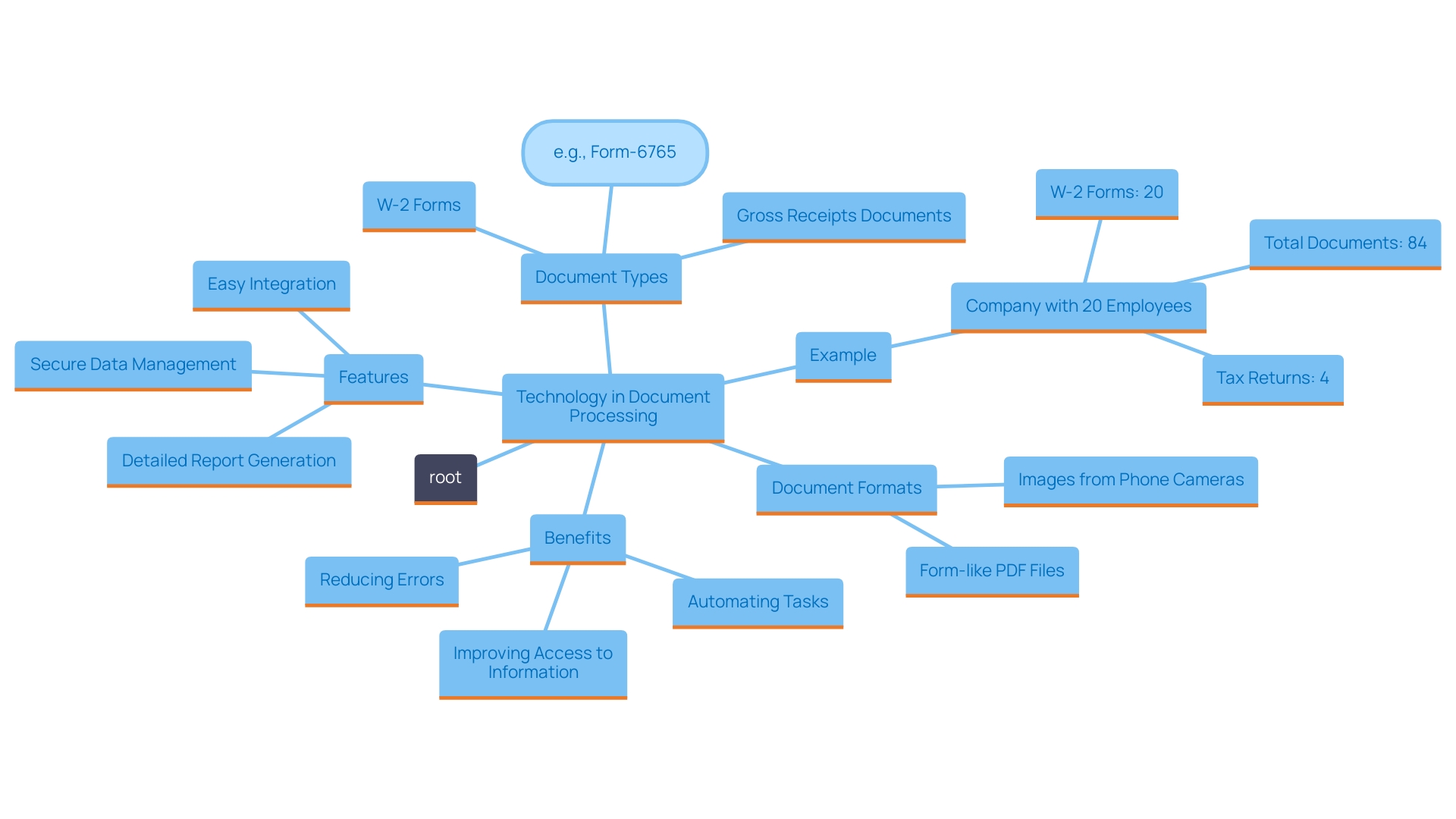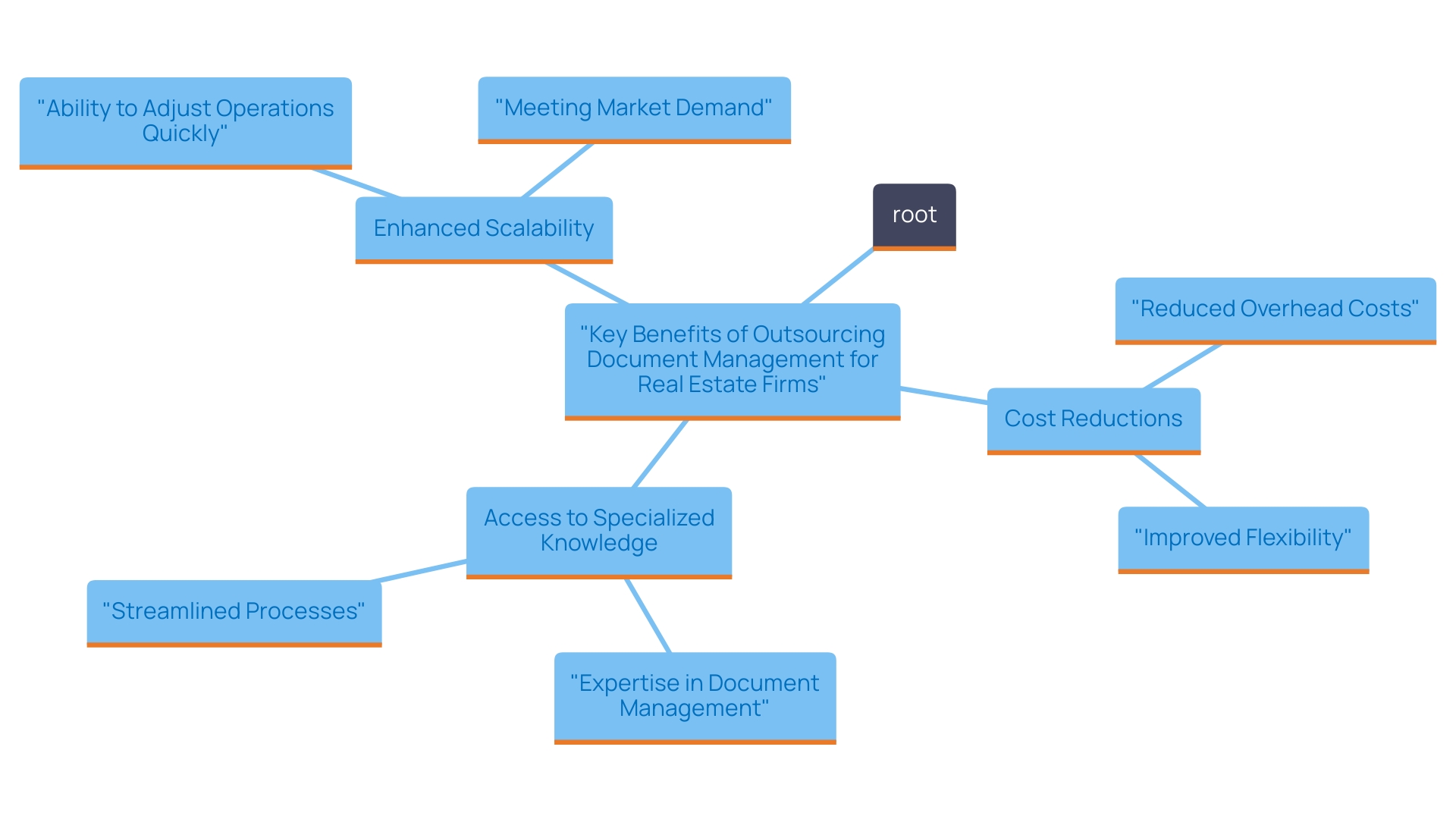Introduction
Outsourcing title processing has emerged as a strategic solution for real estate professionals aiming to enhance operational efficiency and reduce costs. By entrusting title verification tasks to specialized external experts, organizations can tap into a wealth of knowledge and resources that streamline workflows and improve accuracy. However, navigating this complex landscape requires a keen understanding of the essential factors that contribute to successful outsourcing, from selecting the right partner to leveraging cutting-edge technology.
This article delves into the fundamental aspects of title processing outsourcing, offering insights into best practices, compliance considerations, and the transformative impact of technology on the industry. As the demand for efficient and secure title services continues to grow, understanding these elements is crucial for real estate firms seeking to maintain a competitive edge.
Understanding the Basics of Title Processing Outsourcing
involves delegating the tasks associated with property ownership verification to external specialists. This approach can significantly enhance efficiency by leveraging specialized skills and resources. Key benefits include:
- Access to a wider talent pool
- Reduced operational costs
- The ability to focus on core business activities
Understanding the basics of this process helps real estate professionals identify when and how to engage outsourcing for optimal results. Additionally, awareness of potential pitfalls, such as communication barriers and quality control challenges, is vital for successful outsourcing.

Choosing the Right Partner for Title Processing
Choosing the appropriate partner for document processing necessitates a thorough assessment of various essential criteria. Firstly, assess their experience within the industry, as seasoned providers are more likely to have a nuanced understanding of title processes and compliance requirements. The technology they employ is another crucial factor; advanced systems can streamline operations and mitigate errors. Furthermore, their dedication to information security cannot be overstated, particularly given that 67 practices related to security breaches have been identified in the industry. Recent news highlights the evolving standards in data security practices, making it imperative to choose an associate who is not only compliant but also proactive in enhancing security measures.
Thorough due diligence is essential. Start by reviewing case studies and client testimonials to gauge the collaborator’s track record. For instance, a renewable energy company enhanced its project management leadership skills through strategic team development, which significantly improved organizational effectiveness. This example demonstrates the significance of an associate who encourages teamwork and ongoing enhancement, traits that are equally vital in the document management field.
Scheduling consultations is another step in the vetting process. These meetings will help you evaluate their communication style and responsiveness, ensuring they align with your organizational culture. A competitive pricing model is attractive, but it should not come at the expense of quality. The perfect associate will exhibit a profound comprehension of process systems and a strong compliance framework, consistently providing high-quality outcomes.
Industry specialist Haitham Medhat Abdelaziz Elsayed Aboulilah stresses the significance of a robust theoretical foundation and practical methodology in research, which can be utilized for choosing a collaboration associate. This method guarantees that your selected partner not only fulfills but surpasses your expectations, aiding in the .

Leveraging Technology for Efficient Title Processing
Incorporating technology into document processing can significantly streamline workflows. Consider utilizing platforms that employ machine learning for information extraction and optical character recognition for digitizing documents. These technologies can automate repetitive tasks, reduce human error, and enable quicker access to information. Moreover, ensure that the technology utilized by your outsourced collaborator aligns with your organizational needs, offering features such as:
- Secure data management
- Easy integration with existing systems
- The ability to generate detailed reports

The Advantages of Outsourcing Title Processing
Outsourcing document management offers various benefits, such as:
- Cost reductions
- Access to specialized knowledge
- Enhanced scalability
By leveraging external resources, real estate firms can reduce overhead costs associated with maintaining in-house teams, allowing for reinvestment in other areas of the business. Additionally, outsourcing enables flexibility in managing work volume—companies can quickly scale operations up or down based on market demand, ensuring that they can respond promptly to changes without compromising quality.

Ensuring Compliance and Security in Outsourced Title Services
When outsourcing title processing, it is vital to ensure that your partner complies with all relevant . Begin by verifying their certifications and credentials. Conduct audits to evaluate their security measures, ensuring that client information is protected against breaches. Establish clear contracts that outline compliance obligations and data handling procedures. Regular communication regarding compliance updates and potential changes in legislation is also crucial to maintaining a secure and compliant outsourcing relationship.
With the ParseAI platform, document handling for landmen is revolutionized through advanced OCR technology and interactive labeling features that streamline runsheet creation. For instance, clients have reported a 30% reduction in processing time due to the platform's efficiency. Harbinger Land's expertise in mineral leasing and acquisitions, supported by meticulous research and initial ownership checks, ensures that clients receive accurate leases while educating potential lessors on the benefits of domestic energy production. Furthermore, Harbinger Land offers document imaging services that digitize property data, allowing title agents to conduct title research and leasing efficiently and cost-effectively.

Conclusion
Outsourcing title processing has become an indispensable strategy for real estate professionals seeking to enhance their operational efficiency and reduce costs. By delegating title verification tasks to specialized external experts, firms can access a wealth of knowledge and resources, resulting in streamlined workflows and improved accuracy. Understanding the fundamentals of this outsourcing process is crucial for identifying the right time to engage external partners and for maximizing the benefits of this strategic decision.
Choosing the right partner is paramount. Evaluating potential partners based on their industry experience, technological capabilities, and commitment to data security ensures a successful collaboration. A thorough vetting process, including reviewing case studies and conducting consultations, can reveal the partner’s ability to meet compliance requirements while maintaining high-quality service.
The integration of advanced technology further enhances efficiency, allowing for automation and improved data management.
The advantages of outsourcing extend beyond cost savings; they include access to specialized expertise and scalable operations that respond effectively to market fluctuations. However, maintaining compliance and security cannot be overlooked. Ensuring that partners adhere to relevant legal and regulatory standards is essential for safeguarding client information and sustaining a trustworthy outsourcing relationship.
In conclusion, embracing title processing outsourcing offers a pathway to greater efficiency and competitive advantage in the real estate sector. By carefully selecting partners, leveraging technology, and prioritizing compliance, firms can position themselves for success in an ever-evolving landscape. As the demand for efficient and secure title services increases, understanding and implementing these best practices will be key to thriving in the industry.
Frequently Asked Questions
What is outsourcing document management in real estate?
Outsourcing document management in real estate involves delegating property ownership verification tasks to external specialists, which enhances efficiency by utilizing specialized skills and resources.
What are the key benefits of outsourcing document management?
The key benefits include access to a wider talent pool, reduced operational costs, and the ability to focus on core business activities.
What should real estate professionals understand about outsourcing document management?
Real estate professionals should understand the basics of outsourcing to identify when and how to engage it for optimal results, as well as be aware of potential pitfalls like communication barriers and quality control challenges.
What criteria should be assessed when choosing a partner for document processing?
Essential criteria include the partner's industry experience, the technology they employ, and their dedication to information security.
Why is information security important in document processing outsourcing?
Information security is critical due to the high number of security breaches in the industry, making it vital to choose a partner who is compliant and proactive in enhancing security measures.
How can due diligence be performed when selecting an outsourcing partner?
Due diligence can involve reviewing case studies and client testimonials, scheduling consultations to evaluate communication style, and ensuring a competitive pricing model without compromising quality.
What technologies can streamline document processing workflows?
Technologies such as machine learning for information extraction and optical character recognition for digitizing documents can automate tasks, reduce human error, and enable quicker access to information.
What features should technology used in document processing have?
The technology should offer secure data management, easy integration with existing systems, and the ability to generate detailed reports.
How does outsourcing document management improve scalability for real estate firms?
Outsourcing enables flexibility in managing work volume, allowing companies to quickly adjust operations based on market demand without compromising quality.
What steps should be taken to ensure compliance when outsourcing title processing?
Steps include verifying partner certifications, conducting security audits, establishing clear contracts outlining compliance obligations, and maintaining regular communication about compliance updates.




